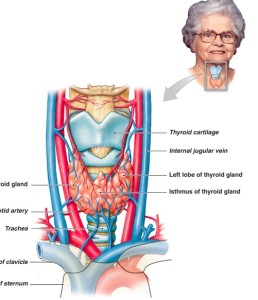Dr. Fitch is periodically answering your questions about health in our newsletters. You can ask Dr. Fitch a question using this anonymous form.
Question from our reader: My Thyroid Stimulating Hormone (TSH) is 1.5 mIU/L. I am having symptoms of sweating and hot flashes. What should my levels be reports as?
 Dr. Fitch: The thyroid gland is the main endocrine gland of our body. The thyroid is responsible for regulating our body’s energy, body temperature, and hormones. This gland sits like a butterfly on our neck under the “Adam’s apple.” The lobes or wings of the thyroid release the thyroid hormones into the blood stream, the main ones being thyroxine (T4) and triiodothyronine (T3), which is more active. These hormones in turn are in charge of activating the other systems in our body that control our energy and growth.
Dr. Fitch: The thyroid gland is the main endocrine gland of our body. The thyroid is responsible for regulating our body’s energy, body temperature, and hormones. This gland sits like a butterfly on our neck under the “Adam’s apple.” The lobes or wings of the thyroid release the thyroid hormones into the blood stream, the main ones being thyroxine (T4) and triiodothyronine (T3), which is more active. These hormones in turn are in charge of activating the other systems in our body that control our energy and growth.
The need to regulate our body’s energy and growth is controlled by our brain’s pituitary production of Thyroid Stimulating Hormone (TSH). TSH triggers the thyroid to release T4 and T3 in response to the needs of the body. Once the needs has been meet and the correct amount of circulating T3 and T4 are detected by the brain, then the pituitary can discontinue producing large amounts of TSH. Without the proper regulation and the proper amount of hormones, we can feel fatique and gain excessive weight if we don’t have sufficient amount, Hypothyroidism; or, feel anxious and experience excessive weight loss if we have too much, Hyperthyroidism. A doctor will monitor your TSH initially to determine your proper function which may range from 0.5-5 mIU/L but in order to adjust she/he may also ask to test your T3 and T4 level to determine the actual active hormone in the body.
The thyroid may be subjected to several different diseases. Overactive thyroid disease is considered hyperthyroidism and may be caused by an illness, abnormal white blood cells stimulatin, or cancer. In contrast, an underactive thyroid or hypothyroidism may be caused from malnutrition of iodine or destruction by white blood cells. This condition will need to have supplementation of the thyroid hormone in order to help regulate your body’s function and will have to be specifically tailored to the indivisual. Your doctor will be able to offer a variety of medications and management and will need to monitor your thyroid function annually once stabilized to determine further adjustment. The specific level will be determined individually but other conditions should also be discussed if a person is still having symptoms.
Sincerely,
Dr. Michael Fitch
www.conciergemedicineofalaska.com

